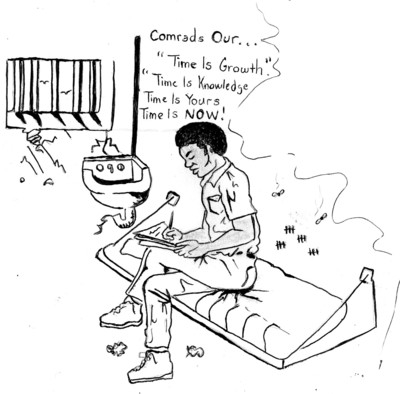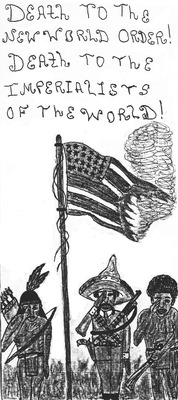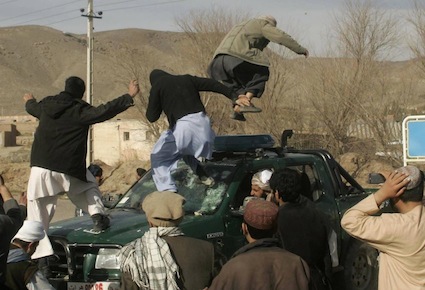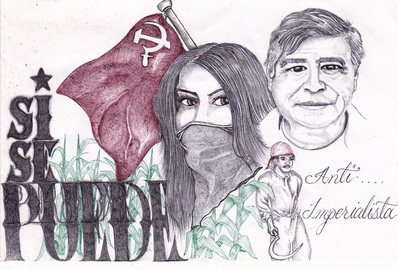
Amerikan Torture Culture Hits Migrants
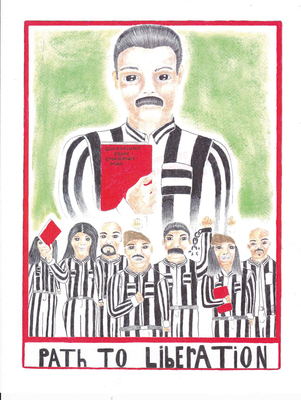
While these terms are relatively short compared to what has become normal in the United $tates, the experiences are particularly difficult for migrants who don’t speak English and have been the victims of humyn trafficking.
The authors of the article cited above cautiously state that the United $tates uses solitary confinement more “than any other democratic nation in the world.” This implies that other countries may use solitary confinement more. One reason they cannot get stats on imprisonment practices in some countries is that they are U.$. puppet regimes purposely run under a veil of secrecy to allow extreme forms of repression of the most oppressed peoples. We have seen no evidence of a mythical nation that is torturing more people in solitary confinement than Amerika.
Amerikans imprison more people than any other nation even if we exclude the people they are holding in prisons in other countries. With at least 100,000 people in long-term isolation within U.S. borders, it seems unlikely that any other country can top that. Further evidence exists by looking at the state of prisons in many Third World countries, which are far more open than even the low security prisons in the United $tates. And the exceptions to this rule are all countries with heavy Amerikan military/intelligence activity, and usually Amerikans themselves are running the prisons.(3)
U.$. citizen Shane Bauer was imprisoned on charges of spying by the government of Iran, which is independent from the United $tates. Bauer offers examples of how his time in solitary confinement differed in both positive and negative ways to those held in Pelican Bay SHU in California. But one stark contrast is the time in solitary, which for him was only four months. In a comparison of the “democratic” U.$. injustice system and that of Iran, Bauer wrote:
“When Josh Fattal and I finally came before the Revolutionary Court in Iran, we had a lawyer present, but weren’t allowed to speak to him. In California, an inmate facing the worst punishment our penal system has to offer short of death can’t even have a lawyer in the room. He can’t gather or present evidence in his defense. He can’t call witnesses. Much of the evidence – anything provided by informants – is confidential and thus impossible to refute. That’s what Judge Salavati told us after our prosecutor spun his yarn about our role in a vast American-Israeli conspiracy: There were heaps of evidence, but neither we nor our lawyer were allowed to see it.”(2)
He later cites a U.$. court ruling:
“the judge ruled that ‘a prisoner has no constitutionally guaranteed immunity from being falsely or wrongfully accused of conduct which may result in the deprivation of a protected liberty interest.’ In other words, it is not illegal for prison authorities to lie in order to lock somebody away in solitary.”(2)
California’s notorious Pelican Bay reports an average time spent in the Security Housing Unit there as 7.5 years. Many who fought for national liberation from U.$. imperialism have spent 30 to 40 years in solitary confinement in prisons across the United $tates. MIM(Prisons) has not seen reports of long-term isolation used to this extreme by any other government.
The torture techniques used in Amerikan control units were developed to break the spirits of people and social groups that have challenged the status quo, and in particular U.$. imperialism. Thirty years after their demise, materials from the Black Panther Party still get people in trouble regularly, sometimes even with a “Security Threat Group” charge. That’s the Amerikan term for a thought crime.
It could be that these techniques are being expanded into migrant detention centers as a form of discipline of the Mexican proletariat that Amerikans fear as a force of social change. Or it could just be a case of oppressor nation culture spreading its tentacles into other nations. Either way, this is just one of many forms of oppression that serve to undermine the propaganda myth of Amerika as a nation that promotes freedom.
For years, the United $tates has been under criticism by the United Nations as the principal state using torture in the form of long-term isolation. Today, the United Nations High Commissioner for Human Rights said, “We must be clear about this: the United States is in clear breach not just of its own commitments but also of international laws and standards that it is obliged to uphold.”(4) This was in a statement addressing the 166 foreign nationals held in Guantanamo Bay Prison for more than a decade, most without charges.
Just as high-tech weaponry could not win the war in Afghanistan for the Amerikans, the sophisticated torture techniques of the modern control unit cannot overcome the widespread outrage of the masses living under imperialist domination. The opportunities for making internationalist connections to the prison movement within U.$. borders only increases as more people from outside those borders get swept up in the system.
Related Articles:This article referenced in:








